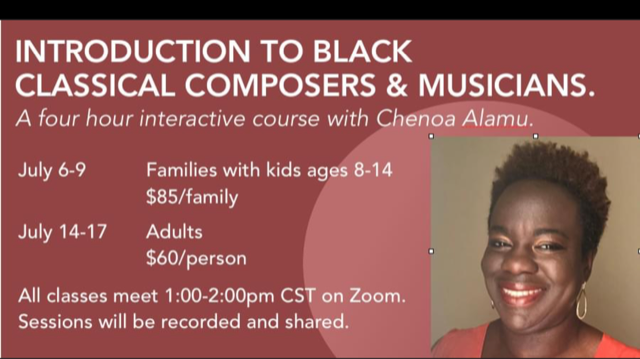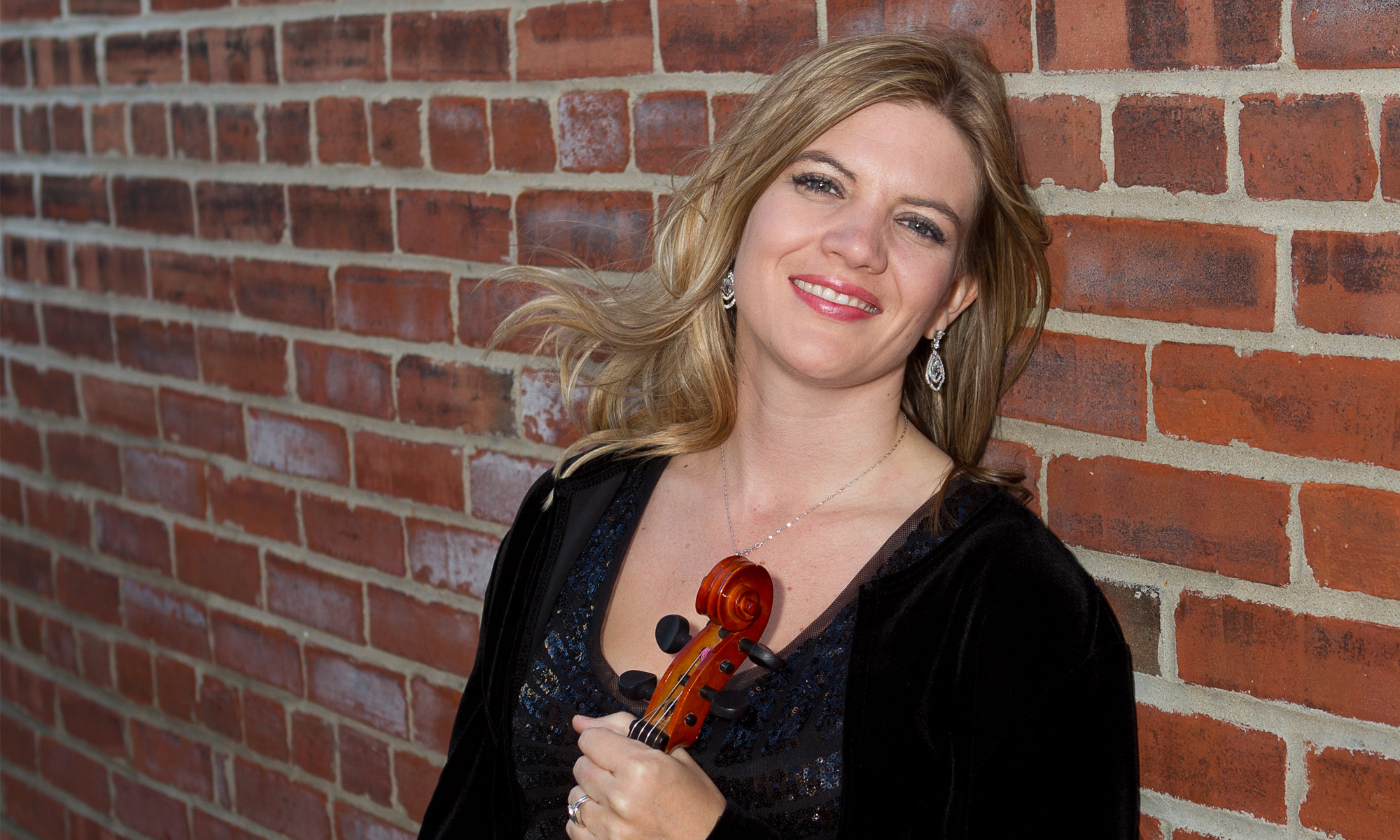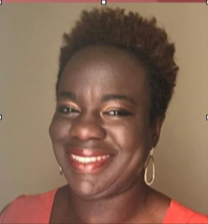
Chenoa Alamu resides in Springfield, is a violinist in the Illinois Symphony Orchestra, Peoria Symphony Orchestra, and the Decatur-Millikin Symphony Orchestra. She teaches violin and viola privately, and is a Starter Strings Teacher through the Sangamon Valley Youth Symphony programs and Springfield Public School District #186. She’s the homeschooling mother of two beautiful children, Victoria and Jonathan.
Chenoa, as a music history aficionado, I’m thrilled about your upcoming course: Introduction to Black Classical Composers & Musicians! Can you share with us your inspiration for this course?
I am a homeschooling mom of two, and last year, I came across an opportunity to teach a class through Huddleston Academy Live Academics, which is a virtual academic platform for homeschooling families. I figured with my classical music background and the lack of diversity in the field, this was the perfect opportunity. I taught the class in October.
Fast forward to now, with racial tensions (the killings of George Floyd and Breonna Taylor in particular) and protests happening in this country and around the world, teaching this class is my way of educating people about the achievements and contributions of Black classical composers and musicians. I believe there is a hunger for this knowledge. People want to be educated. People are looking for ways to get involved. I can’t think of a better way to get involved than through education.
Who do you consider the most influential Black classical composer?
Great question! In my opinion, I would say Joseph Bologne, Chevalier de Saint-Georges (1745-1799). He was dubbed ‘le Mozart noir’ or Black Mozart. He’s remembered as the first classical composer of African descent.” Not only was he a violinist, harpsichordist, champion fencer, and army veteran, but he also conducted and premiered Haydn’s Paris Symphonies in 1787. He led one of the best orchestras in Europe-Le Concert des Amateurs. Former US President John Quincy Adams judged him “the most accomplished man in Europe”. Even Mozart himself envied Bologne because, at the time, he was struggling to make his music heard. There is a popular theory that Mozart swiped one of Saint-Georges’ ideas in his Sinfonia Concertante. His jealousy may have fueled the creation of the villainous black character Monostatos, who appears in his opera The Magic Flute. Bologne’s story is truly fascinating!
Yes, this is amazing! I can’t wait to delve more into his story in your class.
Chenoa, how do you find balance in your life as a music teacher, orchestral musician, and mother?
Ashley I’m not sure I have found balance just yet! LOL Having a desk calendar helps, as this allows me to see my schedule all at once. That way I can plan mentally and emotionally for what is coming up. Meditating in the mornings and writing in my gratitude journal helps me to start my day spiritually grounded. When my fiancé comes to visit from Scotland, he is a big help. My children help. Otherwise, I try to take it one day at a time for the most part. I am still learning to give myself grace when I am tempted to feel guilty because some area of my life seems neglected. I am only human and that is ok.
What recommendations do you have for the music community to better integrate Black composers into our curriculum?
There are few things I would recommend:
- Educate yourself. Show an interest. There are over 300 black classical composers and musicians both deceased and alive. Realize that this music is being hidden for a reason and aim to do your own research.
- Once you have educated yourself, make it a point to highlight the works of these musicians. Call your local classical music radio station and request that more music be heard from black composers and musicians. Share the information with your colleagues, on your blog, your podcast, encourage your students to research these musicians. Come up with a project where you and your students can do research together. Start with a simple question such as, what black composers were alive during the time of Mozart, Beethoven, or Brahms? Google is your friend.
- Get to know more black classical musicians. Believe it or not, we are out there making a living in this field. We are not hiding. We have chosen this field because we love it. Having relationships are breeding grounds for good conversations and opportunities for personal growth and development. It is also a great opportunity to gain a wealth of knowledge that you may not have had before.
- If you are a member of a symphony orchestra, go to your conductor or musician’s committee and offer recommendations for repertoire that highlight black classical composers.
- Wherever you purchase your sheet music, ask if there is repertoire from black composers. I could go on and on, but the main point I’m trying to make is that it will take effort and intentionality to integrate music from black composers into the music community. It will not happen by default.
Thanks so much, Chenoa. You’ve given us so much to think about. This has definitely peaked my interest, and I can’t wait for class to begin!
Chenoa Alamu was born and raised in Memphis, TN. At the age of two, she attended her first classical music concert given by Japanese violin students of Dr. Shinichi Suzuki. This sparked her interest in the violin. Her mother enrolled her in the Suzuki Violin Program a year later.
Demonstrating her love and enthusiasm for music, Chenoa continued to develop her natural ability and trained gift in violin and vocal studies throughout her childhood and teenage years. She attended the Overton High School of Performing Arts, summer music camps such as Aspen Music Festival, Interlochen Summer Arts Camp, Sewanee Music Center, and the Governor’s School of Performing Arts. She has achieved both Bachelor of Music and Master of Music degrees in Violin Performance from the Cincinnati Conservatory of Music. Her principal teachers during these earlier and formal years of study were Yuko Honda, Pak-Chung Cheng, Katherine Wolfe, Kurt Sassmannshaus, Dorothy Delay, and Dr. Won-Bin Yim.
She has also spread her wings in the Christian music industry and has shared the stage with the likes of Darwin Hobbs, Michael Card, Nicole C. Mullen, Kirk Whalum, Sara Groves, Phillip Keaggy, to name a few!

